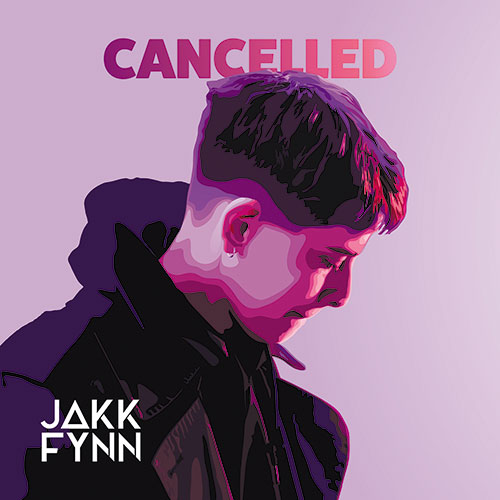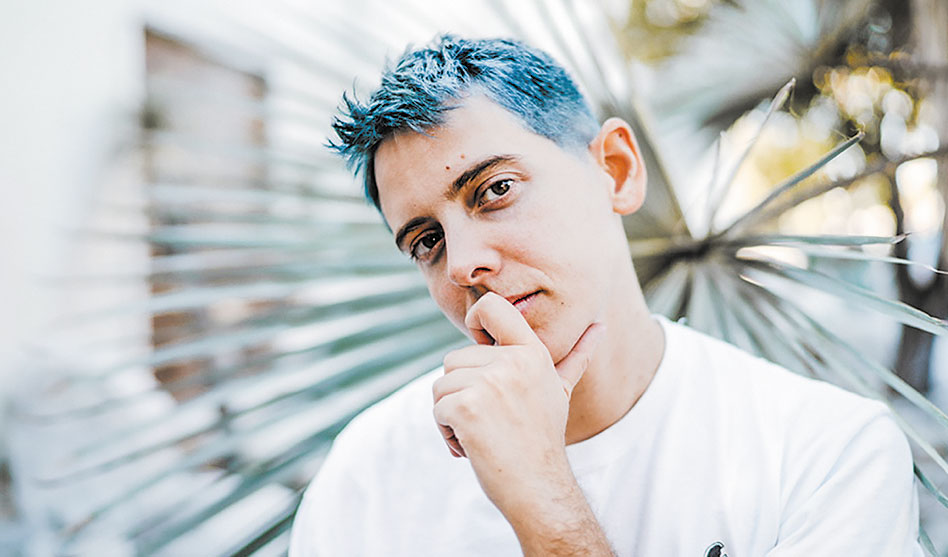How music saved trans pop singer Jakk Fynn
JOHN CARDER MCCLANAHAN | Contributing Writer
john.mcclanahan91@gmail.com
About 15 months ago, L.A.-based pop singer Jakk Fynn sat up in a hospital bed feeling like a load had been lifted off him. Fynn had just undergone so-called “top surgery,” a step to complete his upper body transformation to fit the male mold. But for Fynn, who identifies as transmasculine Latinx, the surgery created a chance to live and express himself as the person he is.
 Earlier this year, Fynn dropped his first EP, prophetically titled Cancelled, which included a music video for his up-tempo dance single “Fire.” In the video, a diverse group of young men and women dressed in white jumpsuits line up within an ambiguous setting. As they move through the line, a mysterious figure brushes paint strokes on each ones backside, marking either triangle or circle symbols that are somewhat evocative of gender labeling. Shots of Fynn singing flash throughout the video. But toward the end, the group of individuals strip off their jumpsuits and dance in celebration, shedding the unchosen symbols added to them.
Earlier this year, Fynn dropped his first EP, prophetically titled Cancelled, which included a music video for his up-tempo dance single “Fire.” In the video, a diverse group of young men and women dressed in white jumpsuits line up within an ambiguous setting. As they move through the line, a mysterious figure brushes paint strokes on each ones backside, marking either triangle or circle symbols that are somewhat evocative of gender labeling. Shots of Fynn singing flash throughout the video. But toward the end, the group of individuals strip off their jumpsuits and dance in celebration, shedding the unchosen symbols added to them.
Like those depictions, Fynn learned to shed repressive shells which hid his true self. He did so multiple times in his life and sometimes without the benefit of doing so on his own terms.
From an early age, Fynn used music as refuge when he faced social adversity. Creative expression became the biggest constant in his life. But as Fynn grew to understand the intersectionality of his passion for music, sexuality and gender identity, he struggled to garner acceptance from those closest to him.
 Childhood in Los Angeles wasn’t easy for him. His mother and father split, leaving him to his Mexican grandparents to raise. Growing up in a conservative and religious Latin culture, self-expression became restricted, and his family expected Fynn to live by the female label given to him at birth. (Years before he adapted the Jakk Fynn moniker, his family called him something else, a name he does not use now.)
Childhood in Los Angeles wasn’t easy for him. His mother and father split, leaving him to his Mexican grandparents to raise. Growing up in a conservative and religious Latin culture, self-expression became restricted, and his family expected Fynn to live by the female label given to him at birth. (Years before he adapted the Jakk Fynn moniker, his family called him something else, a name he does not use now.)
“My grandparents were old school, traditional, with all this kind of more masculine machismo undertones that impacted my ability to express myself,” Fynn says. “My grandmother pushed me to present a certain way — dye my hair and wear makeup and get rid of my arm hair so I could attract a good male partner.”
In junior high, Fynn found solace in music. A close aunt exposed him to ’90s pop; he began rocking out to Nirvana and Pearl Jam, while expressing a more feminine vibe when he jammed to Britney Spears and The Backstreet Boys. During his tween years, he picked up an electric guitar and began strumming and singing “pretty terribly, but I felt at that point things began to pivot.”
Music soon became passion, which opened a realm to which Fynn could escape. By the time he enrolled in high school, Fynn aspired to earn a degree from Boston’s Berklee College of Music. But his grandparents rejected the idea.
“They refused to pretty much accept or support me in the music realm as well,” Fynn says. “That was a big point of contention between them and myself, because they wanted me to go to a four-year [university] and didn’t want me to waste my time on music.”
Fynn’s high school years were tumultuous as he constantly tried hiding his sexuality, while his family embraced sterner religious beliefs, attending evangelical sermons almost every Sunday. Yearning to live as himself, Fynn became more rebellious, which led his grandparents to give him an ultimatum — abide by traditional practices or move out.
“I said, ‘Forget your ultimatum,’ and I got kicked out, and they were really confused as to why I was so angsty,” he says. “My aunt and her husband actually went to one of my close friends at the time and interrogated him at his house, and he ended up outing me, saying that I had a girlfriend. I didn’t get to come out myself.”
After that, he continued to openly date women but still felt restricted from living completely free. Not long after, he found someone. But while in the middle of that relationship, he developed stronger feelings for a close friend who he became emotionally dependent on. Despite his partner’s more restrictive ideas about masculinity, Fynn came out as trans.
“When I eventually confronted them about my feelings, they ended up cutting me off, and that really, really hurt me,” Fynn says. “It came to a point where I decided to take a year off, because I had never just been single and alone as trans, and I wanted to learn how to just be alone with myself and be acquainted with myself. [Cancelled] is maybe not directly about that in terms of the content of the songs. But the time period is deeply reflective of that.”
Over time, Fynn’s relationships with his ex-partner and the close friend he lost became amicable as his feelings for them dissolved. But his fear of abandonment and need for acceptance permeated his life, stemming from the trauma left from his earlier homelife.
Now on his own, he needed to convey his newly established self to the ones who knew him longest… on his own terms. Christmastime in 2018, less than a month before his top surgery, he came out as trans to his family.
“That was kind of my compelling reason to make the final step to come out to my grandparents,” Fynn says. “I was about to have surgery, and it’s not like I had a large chest, so I don’t know if they would have necessarily noticed, but I did have anxiety about them maybe noticing, but I was tired of living in fear.”
At first, Fynn’s family did not fully accept him as trans and refused to acknowledge his preferred pronouns, though they still loved to have him around. When he and family went out to eat, using public restrooms triggered his anxiety. But Fynn learned to cope with the nervousness and everyday fears after coming out as trans. And although some friction remains between him and his family, Fynn’s grandparents encouraged him to do what he needed to live a happier life despite their beliefs.
“That was a good thing to hear,” he says with a choke in his voice.
Now as a transmasculine artist treading new avenues in creative culture, Fynn hopes his venture into mainstream music can inspire others to embrace revised notions of masculinity. But more importantly, he wants listeners to live as their true selves.
“Music saved my life,” he says. “Not only from a creative side, where I can express myself and cope through different situations, but it can also be empowering and healing for the listeners as well if it resonates. I’d probably be dead if it wasn’t for music.”

